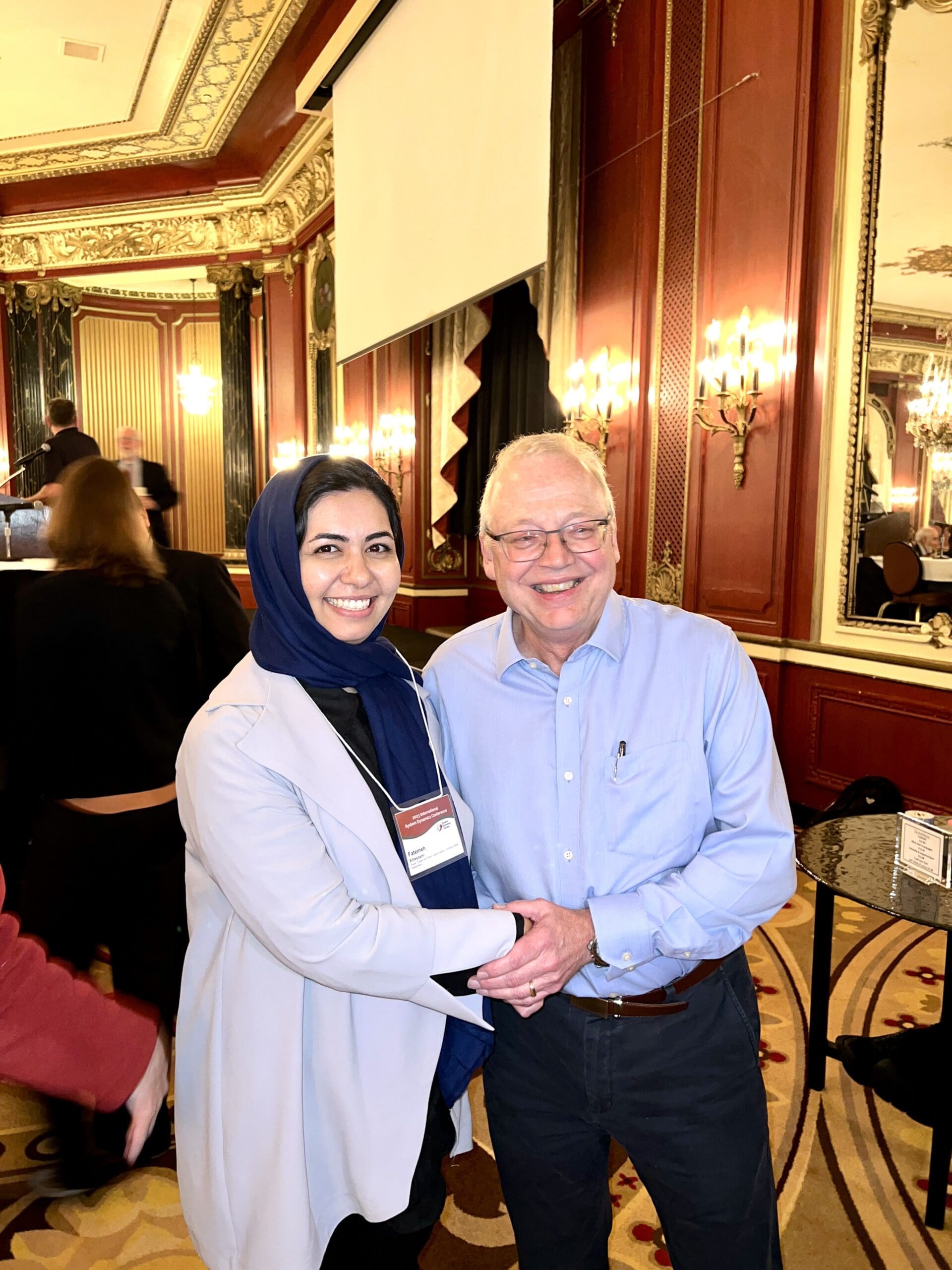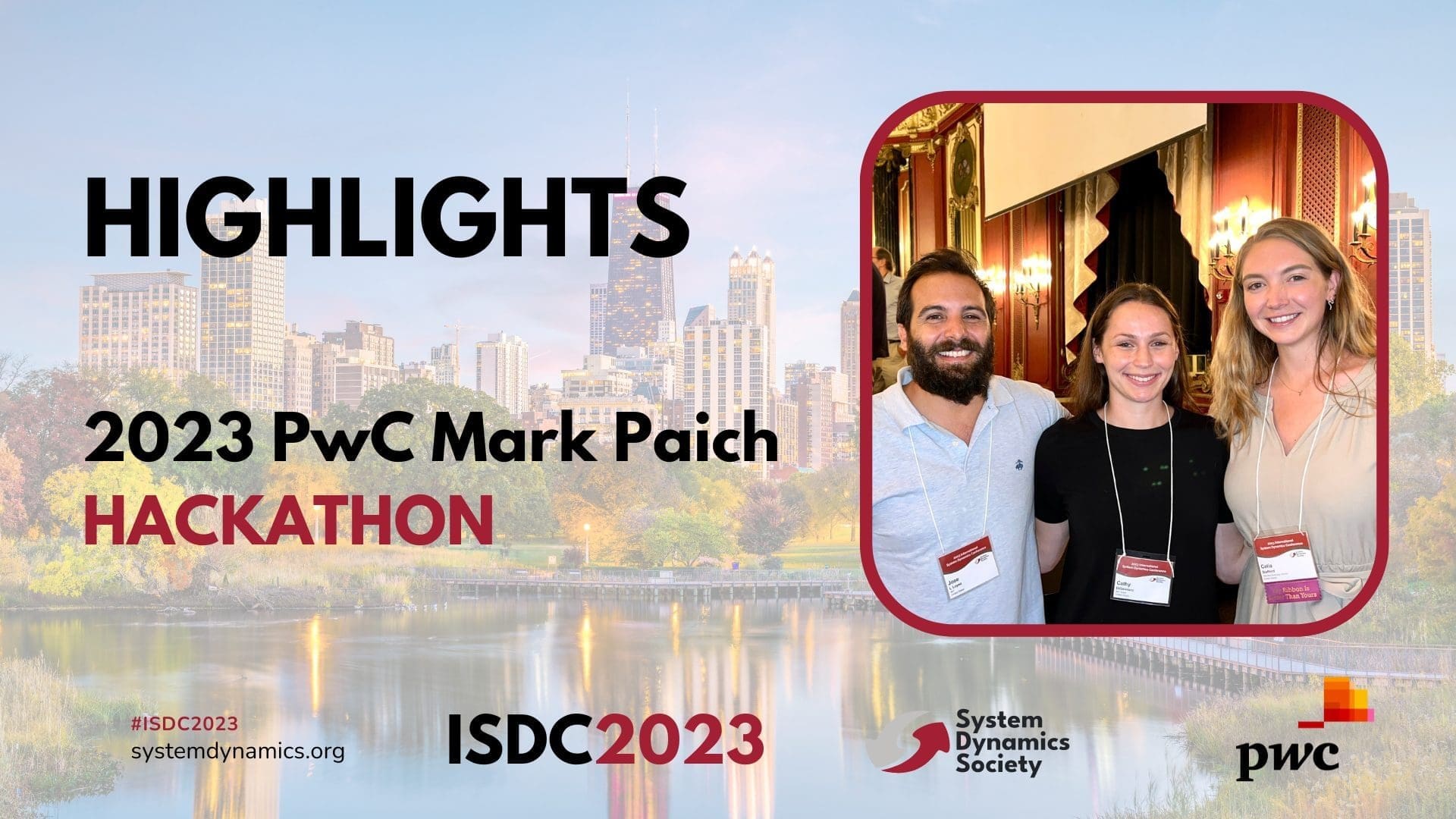2023 PwC Mark Paich Hackathon Highlights
The System Dynamics Society and PwC US joined forces to hold a hackathon event that brought together practitioners, researchers, and students passionate about the System Dynamics methodology. The 2023 PwC Mark Paich Hackathon explored two pressing challenges for our society with a unique lens, fostering diverse ideas, innovation, and creativity.
We had a record of 43 participants from all over the world. These enthusiastic participants formed 18 dynamic teams, showcasing innovation and global collaboration.
The two-day hybrid event held on July 21-22, 2023 attracted participants from varied backgrounds, including academia, industry, and government, who all desired to apply System Dynamics techniques to real-world problems. The challenge themes were Generative Artificial Intelligence (GenAI) and Individualized Healthcare, which prompted participants to consider the potential benefits and significant risks of these leading technologies if mismanaged.
A Tribute to Mark Paich
The 2023 PwC Mark Paich Hackathon honored Mark Paich’s contributions to System Dynamics. He established PwC US’s simulation and modeling practice and was a renowned modeler and mentor. With a Ph.D. in System Dynamics from MIT, Mark taught at Colorado College and returned to MIT Sloan as a visiting lecturer. He received the System Dynamics Society’s Forrester Award and Applications Award.
The Winning Team
The winning entry, titled “Privacy and Wearables: Addressing Pitfalls of Data Sharing with Insurance Providers,” was an insightful piece from Team MITSD, comprising members Celia Stafford, Cathy DiGennaro, and José Luiz Lopez.
The team examined the benefits and drawbacks of incorporating wearables into US healthcare. These devices offer real-time health insights that could shift healthcare from reactive to preventive. However, sharing this data with insurance providers can pose privacy concerns. The team proposed informed consent, transparency, and enhanced cybersecurity to balance Remote Patient Monitoring (RPM) with patient confidentiality. They emphasized the importance of trust in the success of this integration, advocating that insurance companies prioritize health improvements over profit maximization.
In an interview with the victors, the enthusiasm and collaboration that defined their experience was palpable. Celia fondly recalled:
“I think it’s the biggest product I’ve ever put together in that short timeline… having that kind of deadline just encouraged creativity and it also encouraged hard work in a way that was fun!”
Their collaborative experience and ability to maintain a clear direction amidst the challenge set them apart. They won a $3,000 cash prize from the SDS and 1-year subscription of AnyLogic Professional (valued at $10,000), courtesy of AnyLogic.
Key Insight:
Wearables for remote patient monitoring can have transformative potential for proactive health management but data sharing concerns may arise, particularly with insurance companies. Policies, including regulatory interventions, intermittent data collection, and overhauling the healthcare system, are needed to confirm the responsible use of data and public trust.
Downloads: Model | Presentation | Policy Brief
Watch their presentation here.
Runners Up
The runner-up team, Semper Relaxo, comprising Ignacio Martinez-Moyano, Timothy Clancy, and Asmeret Naugle, presented an insightful work titled “Evaluating the Hype-Harm-Control Dynamics of Disruptive Technologies Including Runaway Breakout Risks”.
The team delved into the societal dynamics of generative artificial intelligence (AI) over a 10-year horizon. As generative AI hype increases, societal benefits and harm accumulate. The balance between hype and harm determines the controls put on AI. Unbalanced early and excessive societal harm creates incentives to implement controls that limit the growth of generative AI. Although hype-harm-control cycles are common to all disruptive technologies, the team also explored the unique dynamics of self-generating technologies like AI to ‘break out’ of alignment and escape control under extreme conditions.
In an interview with Semper Relaxo, they reflected on their intense, yet enjoyable experience of the competition, combining both seriousness and humor in their approach. Tim Clancy shared:
“If you have 48 hours, you have to think from the gut… we were just go go go and that sometimes is useful to get out of your head and just create something.”
The team also highlighted the invaluable contribution of humor, crediting memes for giving them a unique edge. They won a cash prize of $1,500 from the SDS.
Key Insight
New technology adoption, especially AI, might cause harm and disruptions in hype cycles. The timing and intensity of these harms determine societal and governmental reactions. There is a potential risk of AI autonomously coding and causing unchecked societal harm. However, the Hype Harm Control simulation offers a promising framework to study the tradeoffs between hype, harm, and control.
Access model and other resources here. Watch their presentation here.
Third Place
The Systems4Health team, consisting of Fatemeh Ehteshami and Pei Shan Loo, secured third place. Their team presented a model focused on using mobile health technology (M-health) to improve hypertension management and treatment adherence.
Their work, titled “Leveraging Mobile Health Technology to Improve Hypertension Management and Treatment Adherence”, highlighted M-health’s transformative power in providing personalized data to help patients monitor their blood pressure and enhance treatment adherence. While acknowledging potential benefits, they emphasized challenges such as health disparities and stressed the importance of equitable access to M-health. The team concluded that inclusive adoption of M-health is crucial for effective hypertension management and reducing cardiovascular disease (CVD) risks.
They won a cash prize of $500 from the SDS.
Key Insight
Mobile health technology can help manage hypertension by providing personalized data, encouraging treatment adherence, and enabling remote patient monitoring. Patients can actively manage their hypertension, which can lead to timely interventions and better cardiovascular disease prevention. However, it is crucial to address health inequalities and enable equitable access to this technology for all patients, in order to achieve holistic hypertension care and effective CVD outcomes.
Access the model and other resources here. Watch their presentation here.

Acknowledgments
We extend our heartfelt gratitude to PwC for their generous sponsorship, which provided an invaluable platform for innovative thinking and collaboration. Special thanks are also due to our esteemed judges:
John Ansah, Case Western Reserve University
Rod MacDonald, James Madison University
Corey Peck, Ontura
Steve Peterson, Dartmouth, The Peterson Group
Nasim Sabounchi, City University of New York
Their dedication and thoughtful feedback played an instrumental role in the success of this hackathon.
We’d also like to thank the software providers for making available free versions of their products for the hackathon teams: isee systems, AnyLogic, Powersim, and Ventana.
Recent Posts
Call for Presenters: Seminar Series
Call for Presenters: Seminar Series We at the System Dynamics Society are continually seeking vibrant and knowledgeable presenters for our ongoing Seminar Series. As we unfold the calendar, there’s always a place for more insights, experiences, and expertise to enrich...
Honoring Excellence: A Glimpse into the Awards of the International System Dynamics Conference
Honoring Excellence: A Glimpse into the Awards of the International System Dynamics Conference The International System Dynamics Conference brings together experts, practitioners, and students to exchange ideas, showcase real-world applications, and celebrate...
From Bergen to Global: UiB’s System Dynamics Group
From Bergen to Global: UiB’s System Dynamics Group The System Dynamics Group, an autonomous research group at the University of Bergen (UiB) was established in 1971 by professor emeritus Svein Nordbotten. Inspired by the work of Jay W. Forrester, Nordbotten...
Upcoming Events

MIT System Dynamics Seminar | Approaches to Encouraging Health Exchange Participation
You are invited to attend the System Dynamics Seminar being held on Friday, April 26th from 12:30-2:00pm EST in the Jay W. Forrester conference room, E62-450, or via Zoom: https://mit.zoom.us/j/94114971874 (Password: SDSP24). Our guest speaker will be Soheil Ghili...
Recent Business cases
Solving Bottlenecks in Dairy Production Facilities with System Dynamics
Solving Bottlenecks in Dairy Production Facilities with System Dynamics EXECUTIVE Summary FrieslandCampina faced potential bottlenecks in production due to the merging of two factories. They hired SD&Co which employed system dynamics simulation models to predict...
A Design Value Calculator: A System Dynamics Boardgame
A Design Value Calculator: A System Dynamics Boardgame EXECUTIVE Summary Product design is a specific form of complex innovation that touches all areas of an organization’s management. While entrepreneurs recognise the value of design, they often tend to focus...
The World Bank Uses System Dynamics to Identify Root Causes of Poverty
The World Bank Uses System Dynamics to Identify Root Causes of Poverty EXECUTIVE Summary Madagascar has one of the highest poverty rates in the world. In 2022, an astonishingly three out of every four people in Madagascar lived below the poverty line. Poverty has...
Join us
2023 PwC Mark Paich Hackathon
Get ready for two exciting and intense days of collaboration and competition as teams come together for the hybrid PwC Mark Paich Hackathon. Starting on Friday, July 21 before the start of the ISDC2023, teams will compete to solve complex problems using System Dynamics and data science, with judging taking place on Sunday, July 23.
Don’t miss the chance to be recognized for your innovative solutions and join us at the conference banquet to celebrate the winners!
The Challenges: Artificial Intelligence or Health
The hackathon will require thoughtful consideration of new technologies and their potential. Participants will choose one of two challenges relating to Artificial Intelligence or Health.
Teams will have the opportunity to address questions regarding the use of new technologies that have the potential to bring about positive change and also carry significant risks if not thoughtfully considered.
Further details about the challenge will be revealed at the July 21 kickoff meeting.
Prizes
Teams will compete for recognition and a cash price of:
First $3,000
Second $1,500
Third $500



